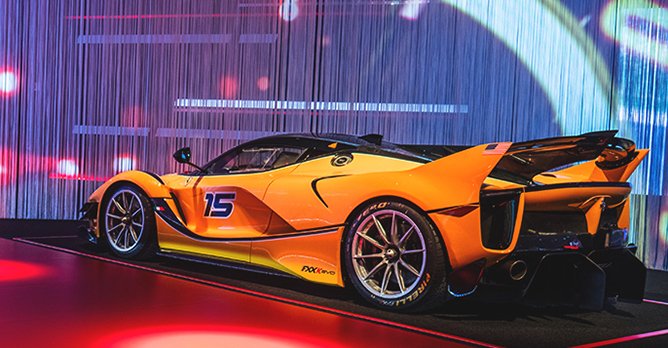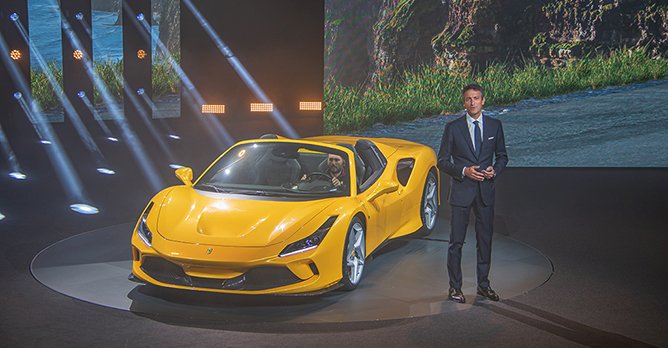Ferrari's universe of exclusivity and technology
24 Sep 2019|14,478 views
With more car brands sinking deep resources into electrification, autonomous technology and future-oriented development, it might not be unfair to wonder if cars are going to become increasingly homogenous in the future.
How do brand's still distinguish themselves? How can you still make products that are deeply special, unique and full of character? Are all electric cars just going to be the same?
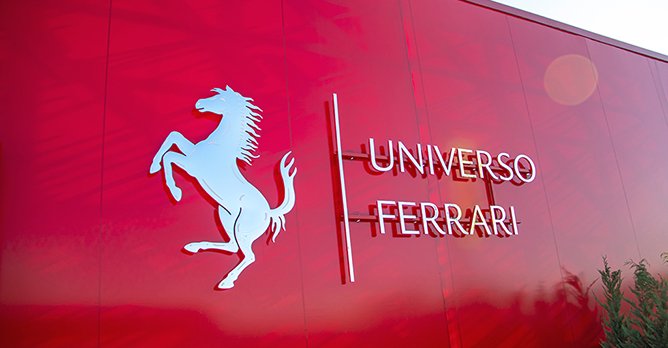
Can you blame it? As a small volume manufacturer of expensive, high performance cars, leaning into this sense of heritage and identity is key to the brand ethos. Don't expect Ferrari to suddenly introduce a 'budget' model, or to significantly ramp up production simply to increase sales volume - that's not the 'Ferrari way', as just about every Ferrari executive will tell you.
Celebrating culture and heritage
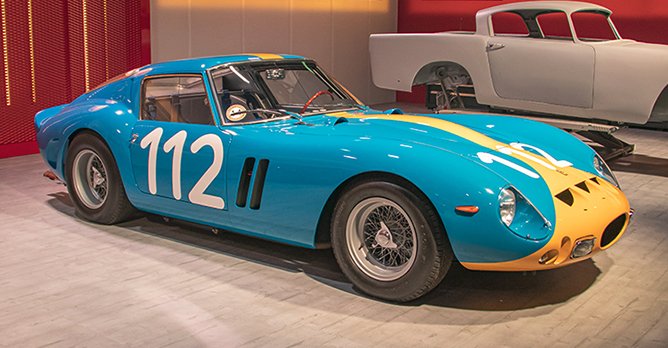
And in the spirit of grand celebrations, this year Ferrari is holding a unique exhibition throughout the month of September - Universo Ferrari. Open to customers, the media, and even fans and enthusiasts (on a couple of weekends), Universo Ferrari is a celebration of heritage, exclusivity and prestige. Whether it's showcasing esteemed classic models like the 250 GTO or extreme track weapons like the FXX-K, Universo Ferrari brings together the very best that Ferrari has to offer.
It's an exhibition that explores the racing roots of the brand, celebrates its motorsport success, and highlights the brand's transformation over time. And qualities like exclusivity, emotionality, sculptural design and sheer performance form the cultural foundation on which all new Ferraris are developed.
Technological prowess
That's not to say that the brand isn't still deeply innovative and invested in technology. For the car geeks, Ferrari is a technological force. Its turbocharged V8 engine is a work of art (best engine in the world four years in a row), the aerodynamic capabilities of its sports cars sensational, and the brand has mastered the dark art of making obnoxiously powerful yet delightfully driveable cars.
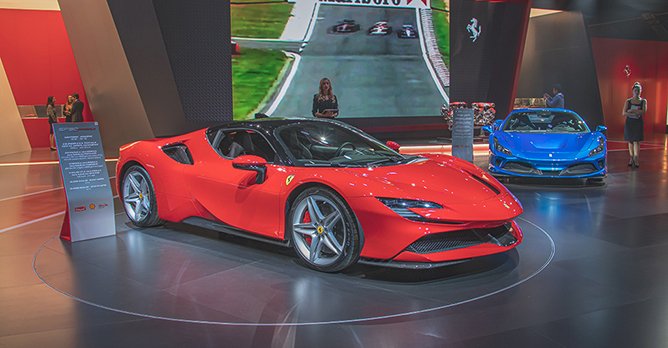
It is this combination of backward-looking heritage and forward-looking technology that comes to define the brand. On one hand, Ferrari has to satisfy its 'traditional' customers who demand, well, a loud, fast and red car with a Ferrari badge (and all the pomp and circumstance that comes with that). On the other hand, the brand has to consistently position itself as the market leader when it comes to high-performance sports cars (racing is fundamental to the brand's DNA). New models, from the Portofino to the SF90, illustrate the brand's ability to innovate, revitalise and elevate its products while still tapping into its deep heritage.
A special soul
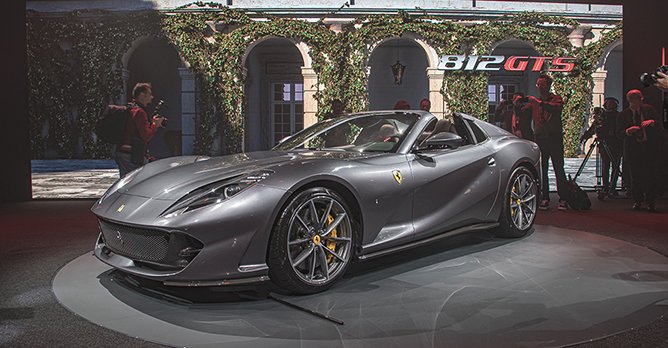
Ferrari makes great cars, no doubt about it. And yes, some buyers may buy a Ferrari for its track-going capability. But for most owners, a Ferrari is more than just a product. It's a symbol, one that stands for success, high-luxury, distinguished individuality.
This is ultimately a brand defined by its customers. How else do you justify the brand skipping the Frankfurt Motor Show in favour of a customer-centric month-long brand exhibition and celebration that also saw two new models concurrently launched (a first for the brand)? It's a brand that can and must put its customers first. More than just paying good money for these cars, each and every Ferrari customer is also a brand ambassador.
Ironically, with the shifting automotive landscape and the challenges of increasing digitisation, a brand like Ferrari is perhaps best-positioned to still have a foothold into the future. Yes, change is inevitable, but the company can (and always will) lean on its deep heritage and passionate customers - Ferraris will always have a place on our roads. Limited in numbers, unique in personality and undeniably special, there is arguably still no experience quite like driving a Ferrari.
So yes, we perhaps shouldn't be too worried about a future where cars are too much the same. After all, the internal combustion engine has powered most of the cars from the past 100 years, and they haven't been that homogenous, no?
No matter how the industry changes, we can be rest assured that Ferrari will always figure out a way to continue to meld heritage and technology to produce special cars that are high-performance, high-quality, high-luxury and highly sought after. That is the 'Ferrari way'.
With more car brands sinking deep resources into electrification, autonomous technology and future-oriented development, it might not be unfair to wonder if cars are going to become increasingly homogenous in the future.
How do brand's still distinguish themselves? How can you still make products that are deeply special, unique and full of character? Are all electric cars just going to be the same?

Can you blame it? As a small volume manufacturer of expensive, high performance cars, leaning into this sense of heritage and identity is key to the brand ethos. Don't expect Ferrari to suddenly introduce a 'budget' model, or to significantly ramp up production simply to increase sales volume - that's not the 'Ferrari way', as just about every Ferrari executive will tell you.
Celebrating culture and heritage

And in the spirit of grand celebrations, this year Ferrari is holding a unique exhibition throughout the month of September - Universo Ferrari. Open to customers, the media, and even fans and enthusiasts (on a couple of weekends), Universo Ferrari is a celebration of heritage, exclusivity and prestige. Whether it's showcasing esteemed classic models like the 250 GTO or extreme track weapons like the FXX-K, Universo Ferrari brings together the very best that Ferrari has to offer.
It's an exhibition that explores the racing roots of the brand, celebrates its motorsport success, and highlights the brand's transformation over time. And qualities like exclusivity, emotionality, sculptural design and sheer performance form the cultural foundation on which all new Ferraris are developed.
Technological prowess
That's not to say that the brand isn't still deeply innovative and invested in technology. For the car geeks, Ferrari is a technological force. Its turbocharged V8 engine is a work of art (best engine in the world four years in a row), the aerodynamic capabilities of its sports cars sensational, and the brand has mastered the dark art of making obnoxiously powerful yet delightfully driveable cars.

It is this combination of backward-looking heritage and forward-looking technology that comes to define the brand. On one hand, Ferrari has to satisfy its 'traditional' customers who demand, well, a loud, fast and red car with a Ferrari badge (and all the pomp and circumstance that comes with that). On the other hand, the brand has to consistently position itself as the market leader when it comes to high-performance sports cars (racing is fundamental to the brand's DNA). New models, from the Portofino to the SF90, illustrate the brand's ability to innovate, revitalise and elevate its products while still tapping into its deep heritage.
A special soul

Ferrari makes great cars, no doubt about it. And yes, some buyers may buy a Ferrari for its track-going capability. But for most owners, a Ferrari is more than just a product. It's a symbol, one that stands for success, high-luxury, distinguished individuality.
This is ultimately a brand defined by its customers. How else do you justify the brand skipping the Frankfurt Motor Show in favour of a customer-centric month-long brand exhibition and celebration that also saw two new models concurrently launched (a first for the brand)? It's a brand that can and must put its customers first. More than just paying good money for these cars, each and every Ferrari customer is also a brand ambassador.
Ironically, with the shifting automotive landscape and the challenges of increasing digitisation, a brand like Ferrari is perhaps best-positioned to still have a foothold into the future. Yes, change is inevitable, but the company can (and always will) lean on its deep heritage and passionate customers - Ferraris will always have a place on our roads. Limited in numbers, unique in personality and undeniably special, there is arguably still no experience quite like driving a Ferrari.
So yes, we perhaps shouldn't be too worried about a future where cars are too much the same. After all, the internal combustion engine has powered most of the cars from the past 100 years, and they haven't been that homogenous, no?
No matter how the industry changes, we can be rest assured that Ferrari will always figure out a way to continue to meld heritage and technology to produce special cars that are high-performance, high-quality, high-luxury and highly sought after. That is the 'Ferrari way'.
Thank You For Your Subscription.














